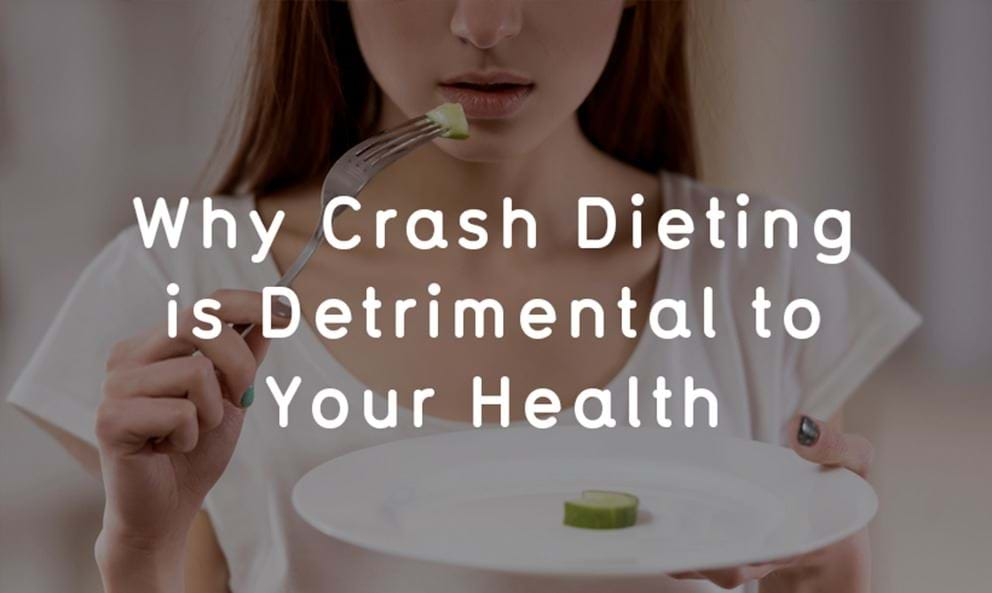Why Crash Dieting is Detrimental to Your Health

When you’ve set your mind on losing weight no matter what, it can be tempting to ignore more sensible diet techniques and go straight for a massive, soul-crushing calorie deficit.
This is called crash dieting, and it’s a bad idea for a bunch of reasons.
Crash Dieting Destroys Muscle
The number one reason why crash dieting is so popular is, of course, because it causes you to lose weight more rapidly than you would on a more reasonable diet.
Notice that the key word here is “weight,” not “fat.”
The simple fact is that when you’re eating far fewer calories per day than you need to maintain your weight and normal physical functions, your body enters “panic” mode and breaks down not only fat, but also muscle and other bodily tissue.[1]
Why does your body do this? Well, provide fuel for your struggling organs.
Needless to say, this isn’t the kind of weight loss you should be after.
Crash Dieting Reduces the Number of Calories You Burn
This one might sound counter-intuitive, but read on.
You know the saying that weight loss is all about “calories in vs. calories out”? Well, it so happens that studies have shown crash dieting tampers with the “calories out” part of that equation,[2] causing your body to burn fewer calories at rest and during activity.
This phenomenon seems to occur with weight loss in general.[3] With a well-structured diet plan, you’ll adjust and compensate for factors like this as you go. On a crash diet, however, you’re just going to see your weight loss eventually stall, and be left with nowhere to turn.
Crash Diets Will Make You Deficient in Essential Nutrients
As if causing your body to devour its own muscle tissue wasn’t bad enough, crash diets are also likely to leave you severely deficient in a bunch of essential nutrients.
One 2010 study[4] which investigated the prevalence of micronutrient deficiencies in subjects following popular diet plans, found that dieting, in general, was associated with a high likelihood of micronutrient deficiency.
For crash diets, that likelihood pretty much becomes a certainty. The more restrictive or extreme a diet is, the greater the odds that you’re missing out on something important.
Obviously, there are serious consequences to not getting enough essential nutrients in your diet.
Being deficient in iron, for example, reduces the number of red blood cells in your body and causes symptoms ranging from heart palpitations to stomach ulcers.[5]
Severe vitamin C deficiency is even worse. It causes “scurvy” – the notorious disease which killed many poorly-fed sailors back in the day. The symptoms of scurvy range all the way from internal bleeding at the joints, to fatal heart complications.[6]
Crash Diets Will Make You Depressed
If you’ve ever been caught up at work and had to do without proper meals for a day or two, you might have noticed that your mood took a dive. It’s just a fact of life that heavy calorie restriction results in depression, irritability, and other negative mood states.
The famous Minnesota Semi-Starvation Experiment, which cycled a 3-month preparation period, with a 6-month semi-starvation period, and a 3-month refeed period, found that subjects reported irritability, lethargy, anxiety, depression and other negative mood states during the calorie restriction portion of the study.[7]
The negative mental effects of a starvation diet aren’t just limited to mood, either. A 1998 study[8] found that subjects on a calorie restricted diet suffered impairments in working memory. Other research[9] has backed these findings, while also suggesting reduced performance in other areas of cognitive function.
Crash Diets Are More Likely to Fail
There’s another element to the negative psychological effects of crash dieting -- the simple fact that they’ll leave you hungry, day and night.
Not only is this an uncomfortable situation by itself, but it also increases the likelihood of you throwing in the towel in a moment of weakness and binging on foods which you would otherwise be avoiding.
A key part of any successful diet plan is making it manageable over the course of your day-to-day life. Ideally, recipes, macronutrient ratios, and odd treats now and then[10] will all be calculated to keep you on track. With a crash diet, on the other hand? All you have is sheer willpower to combat the cramps, hunger pangs and overall misery you’ll experience.
Hollie Miles, GM and Nutritionist
[1] https://www.ncbi.nlm.nih.gov/pubmed/17075583/
[2] https://www.ncbi.nlm.nih.gov/pubmed/10026648
[3] https://www.ncbi.nlm.nih.gov/pubmed/24500156
[4] https://www.ncbi.nlm.nih.gov/pmc/articles/PMC2905334/
[5] http://www.nhs.uk/conditions/Anaemia-iron-deficiency-/Pages/Introduction.aspx
[6] http://www.nhs.uk/Conditions/Scurvy/Pages/Symptoms.aspx
[7] http://jn.nutrition.org/content/135/6/1347.full.pdf+html
[8] https://www.ncbi.nlm.nih.gov/pubmed/9794013
[9] https://www.ncbi.nlm.nih.gov/pubmed/16126305
[10] http://www.sciencedirect.com/science/article/pii/S1057740815000443


